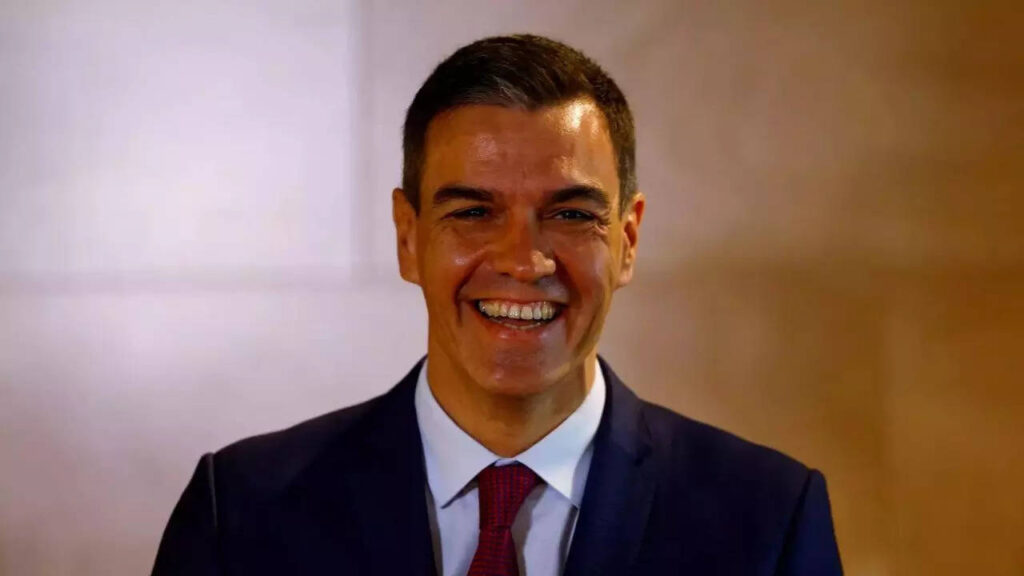By Satyaki Chakraborty
The victory of the centre-left coalition led by the socialist Prime Minister Pedro Sanchez in the Spain’s Parliament on November 17 after two day of fiery debate is a positive signal for the Left in Europe as also for the European Union. The victory was possible due to the PM agreeing to the amnesty for the Catalan separatists resulting in the two Basque parties extending support to the minority coalition. Sanchez Government got 179 votes in 350-member Parliament. The term of this Government is for four years till 2027.
In the general elections on July 23 this year, the main rightist party led by Fezoo along with the far right Vox got171 seats , just five short of majority but all efforts by this right combine to form government failed as no other party was willing to support them. The most important was the two Basque parties with a total of eight seats. After prolonged negotiations, PM arrived at an understanding with the two Basque parties on the basis of the amnesty scheme for the separatist Catalonians who have been facing legal problems. Altogether, Sanchez succeeded in collecting 14 votes outside the Left coalition and this made his win in Parliament possible. The smaller parties had six seats.
The Amnesty scheme has created a big furore in mainland Spain as the common Spaniards are very angry with the Catalonian separatists for their secessionist movement since 2017. PM Sanchez’s Socialist Party as also the Communist Party which is the main Left party in the coalition had reservations. The Catalonian communists suffered at the hands of the protagonists of the separate Catalonia movement. But in the last few months, talks were held with the ruling coalition partners for a solution within the framework of united Spain. The communist Deputy Prime Minister Yalonda Diaz contributed in a big way in facilitating this understanding.
The PM is scheduled to be sworn in for the second term on Friday and as of now, he will have no problem in leading the new ministry to be formed after swearing in. But the real test of the Sanchez government will start after the coalition starts implementing the amnesty deal. The fact is that the Basque parties have many extremists who have still reservations about the deal. They are just waiting for the implementation of the agreement.. The dominant leadership of the Socialist Party is not in favour of giving full sway to the separatists against some of whom there are serious cases of arson and murder. So the process has to be navigated with caution and vision. The Right is waiting in the wings and any differences with the Basque parties will be exploited by the Right to its advantage.
Ahead of Thursday’s parliamentary vote confirming him for a fresh term in office, Spanish premier Pedro Sánchez spoke of a divided country: “Like a hundred years ago, in times of intense change, there is a fierce ideological and political contest between reactionary and progressive alternatives.” Four months after July’s inconclusive elections, and amid ongoing far-right violence, Sánchez positioned himself as the progressive figurehead of a fresh pact between his Socialist Party (PSOE) and the radical-left Sumar led by The Communist Party. But this second term Left coalition will have to be more united and firm on policy implementation for improving the living standard of the common people.
The political situation is tense as the countrymen is vertically divided on the amnesty deal. The proposed legislation itself looks to erase the criminal charges against over three hundred Catalan politicians, activists, and protesters arising from the disputed independence referendum in 2017. The right wing party which ruled at that time took repressive measures as they were adamant against any negotiations with the Catalonian separatists. The courts are also not taking a favourable view of the legislation, it is learnt.
Now, amid a growing revolt among conservative state elites, Sánchez has defended the amnesty as a necessary means of national reconciliation. His victory in a confidence vote on Thursday relied on the support of the two major pro-independence parties, Esquerra Republicana (ERC) and Junts per Catalunya. The first commitment made in his investiture speech was that his government would work to recognize an independent Palestinian state, while his deputy prime minister, Yolanda Díaz from Sumar, announced a further increase in the minimum wage in the coming months.
That way, the centre left combination has taken forward looking programmes in the interests of the Spanish commoners. The deputy prime Minister Diazis very popular among the trade unions as the minister in charge of the labour. The trade unions are solidly behind the Sanchez government. But the problem will be with the judiciary. Even hardcore coalition supporters are not sure about the final view taken by the highest judiciary on the amnesty deal and the legislation. So the Sanchez government has to be prepared for a period of turmoil and not a path of peaceful transition. (IPA Service)




 A Prominent Freedom Fighter, Lifelong Communist N Sankaraiah Passes Away
A Prominent Freedom Fighter, Lifelong Communist N Sankaraiah Passes Away 